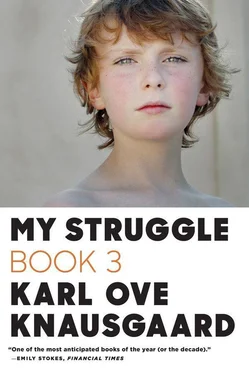“Do you think so?” I said.
“Yes, they still have chicks in the nests. That was why they were so angry at us. Come on.”
Back toward the glittering lights of Arendal, through Tromøya Sound to the quay, with the constant clicking of the crabs and the ghostly rattle from the two full tubs. Dad boiled them as soon as he got home, and there was a sense of liberation at witnessing the pitilessness of the operation: they were taken from the tubs alive, they were dropped into the boiling water alive, and, dead, they floated around slowly on their backs in their bone-white and leaf-brown shells.
Two days after our nocturnal trip Dad was transferred to Kristiansand. He had been offered a job at a gymnas in Vennesla, it was too far to commute, so he had rented a flat in a block in Slettheia. He took all the things he needed in three loads of a hired trailer, and from then on he turned up at home every weekend, and after a while barely that. The idea was that he would look for a house in the Kristiansand area and we would move there the following summer.
It was a great relief when he left. And an incredible stroke of luck that he would change his job the precise autumn I started at the school where he had been employed for thirteen years. If he had been working there I would have felt his eyes on me the whole time and hardly dared to lift a finger without first considering the consequences. That was how it had been for Yngve. But that was not how it would be for me.
The first days at my new school reminded me of those we had experienced when we started the first class six years earlier. All the teachers were new and unfamiliar, all the buildings were new and unfamiliar, and apart from those in our class, all the other students were new and unfamiliar. Here, other rules and codes held sway; here, other rumors and stories circulated; here, the atmosphere was quite different. No one played at this school. No one did French skipping, no one did any skipping, no one played ball, no one played tag or any of the games we played on the playground. The sole exception was soccer. No, what kids did during the break here, in the new school, was lounge about. The smokers hung around in a corner on their own by the wet weather shelter, chatting and laughing and flicking their lighters and smoking their cigarettes, some of them in leather jackets, some in denim jackets, almost all with a moped of some description because a vehicle was part of the life they led. Rumors circulated about some of them, that they had been involved in burglaries, for example, that they had turned up at school drunk, or even that they had tried drugs, which of course they didn’t deny, but nor did they confirm it, they were somehow surrounded by an air of mystery and danger, and who else but John should stand side by side with them on the very first normal school day, laughing his gruff laugh? All of those standing there despised bookish learning, hated school, most were good with their hands, and already wanted to be out in the world of work in the eighth year, and they were given permission, all lost causes were given permission, the school was only too happy to get rid of them. But, the cigarette hanging from the corner of the mouth aside, in practice they behaved no differently from any of the other students because they hung around in gangs as well and chatted and laughed. The girls stood in groups, the boys in other groups. Sometimes the boys baited the girls and there could be a bit of running back and forth and jeering, and on rare occasions fights broke out between two boys, which attracted everyone on the playground to the two of them, like swimmers on a tidal wave, it was impossible to resist.
It took us several weeks to adjust to our new school life. Everything had to be tested. We had to explore the teachers’ limits and preferences. We had to explore the boundaries. Of what went on inside the classroom walls and what went on outside.
In natural sciences we had Larsen, the teacher who had come to school drunk, he always looked as if he had spent the night on the sofa in his clothes and had just been awoken, whatever time of day we had him, he was always a bit torpid and unfocused, but he loved experiments, smoke, and bangs, so we liked his lessons. In music we had Konrad, he was in charge of the youth club, he wore blouse-like shirts under a black vest, had glasses, a round face, moustache, and a little bald patch, was jovial and youthful, so he was on first-name terms with all of us; for math we had Yngve’s previous form teacher, Vestad, a ruddy-faced, bald man with glasses and gimlet eyes; in domestic science, we had Hansen, a bespectacled, gray-haired, strict, missionary-type Frøken who seemed to be genuinely interested in teaching us to fry fishcakes and boil potatoes; in English, Norwegian, history, and social sciences we had our form teacher, Kolloen, a tall, thin man in his late twenties with pointed features and very little patience, who generally kept a distance from us but who could show flashes of empathy and sympathy.
These teachers not only gave general comments and evaluations, as the teachers at our first school had done, no, here they gave us grades for everything we did. This created a very new tension in the class for now we were all given our ideas of one another’s strengths and weaknesses in black and white. It was impossible to keep your grades secret, or it was possible, but it was regarded as bad form. I averaged around a B or B+ and on rare occasions achieved an A, and dropped to a C, but if I didn’t keep the grades quiet inside the classroom, I began to tone them down outside as in recent months I had begun to detect signs that it was not cool to be good at school, that an A, despite what one might assume, was indicative of a character flaw, a deficiency, and not the opposite, which originally it had been meant to express. My status had long been on the wane, now I tried to reverse the process and reestablish a good reputation without of course thinking of anything specific or tangible, it was all based on hunches and intuition according to the social codes people confronted everywhere. In this task I had a huge advantage, namely soccer, where I had met many of the boys in the eighth and ninth classes, among whom there were four or five who were really respected by both boys and girls. I was the only person in my class who could go over to the gang Ronny was in, for example, or Geir Helge, or Kjell, or all of them at once, without them staring at me with eyebrows raised or starting to harass me. They didn’t think that much of me either, I didn’t get a lot from them, but that wasn’t the main point, the main point was that I could actually stand there and be seen standing there. Geir and Geir Håkon and Leif Tore had gone overnight from being little nabobs to becoming little idiots, here they were nobody, here they had to build themselves up anew, and God knows whether they would manage that in the course of the three years they had. I didn’t look their way any longer, except in class, which no longer counted.
During the first weeks of school Lars became my new best friend. He was in the parallel class and so represented something new: he lived in Brattekleiv, where we from Tybakken seldom went, and he played soccer. He was sociable, knew a lot of people, and got along well with everyone. He had curly, auburn hair, was permanently in a good mood, had a loud, ringing, confident laugh, and teased everyone, rarely in a malicious way. His father was a former European skating champion, had participated in various world championships and Olympic tournaments, among them Squaw Valley, their basement was full of cups, medals, diplomas, and a large, dried-up and faded laurel wreath. He was a friendly and considerate though firm man, married to a Dane who couldn’t do enough for those around her.
Читать дальше












